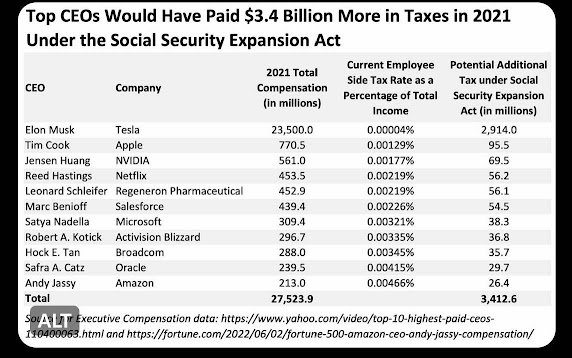From the Committee for a Responsible Federal Budget:
The Social Security retirement and Medicare Hospital Insurance (HI) trust funds are approaching insolvency, with both trust funds expected to be depleted in just seven years. Without action, retirees face an automatic 24 percent benefit cut in 2032, while Medicare hospital payments would be cut by 12 percent. Restoring solvency to these trust funds will require slowing benefit growth, lowering health care costs, increasing revenue, or some combination.
The Social Security and Medicare trust funds are financed primarily by a 15.3 percent payroll tax on wages, split evenly between worker and employer, with the 12.4 percent Social Security tax applied only to the first $176,100 of annual wages in 2025. Proposals to boost revenue often involve increasing the tax rate or the tax cap.
This Trust Fund Solutions Initiative white paper suggests a new alternative – replacing the employer side of the payroll tax with a flat Employer Compensation Tax (ECT) on all employer compensation costs.1 While workers would continue to pay payroll taxes, employers would instead pay an ECT on all wages (with no tax cap) and all fringe benefits such as employer-sponsored insurance and stock options.
Karen E. Smith at the Urban Institute modeled this proposal using the DYNASIM model.2 Using that analysis, replacing the employer payroll tax with an ECT would:
- Raise $2.5 trillion over a decade and 0.7 percent of GDP over 75 years.
- Close two-thirds of Social Security’s shortfall and half of Medicare’s gap.3
- Alternatively, close one-third of Social Security’s shortfall, one-eighth of Medicare’s shortfall, and fund a 1 percentage point cut in payroll taxes – improving solvency while reducing taxes for the bottom 60 percent of workers.
- Extend Social Security solvency by two decades to 2055 and modestly extend Medicare solvency – with further extension if combined with other reforms.
- Increase progressivity, generating revenue mainly from the highest earners.
- Support stronger economic growth than alternative revenue options.
- Improve horizontal equity, efficiency, and simplicity; slow health care cost growth; and avoid viability and revenue stability concerns of alternatives. …




